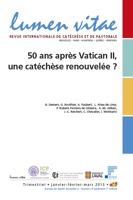 previous article in this issue previous article in this issue | next article in this issue  |

|
Document Details : Title: Initiation et post-modernité Author(s): VILLEPELET, Denis Journal: Lumen Vitae Volume: 66 Issue: 2 Date: 2011 Pages: 127-135 DOI: 10.2143/LV.66.2.2985289 Abstract : Dans cette société post-moderne, il semble peu possible de réactualiser une forme de transmission initiatique qui appartient au modèle holiste de société stable et traditionnelle. Pourtant le chemin de l’initiation peut être considéré comme un chemin fécond d’humanisation/subjectivation. L’auteur estime que pour penser la pertinence éducative de l’initiation en post-modernité, il serait intéressant de regarder de près le processus de l’apprentissage artisanal. Cet apprentissage dans le métier est en réalité l’accès initiatique à un pouvoir faire, plus que l’acquisition technologique d’un savoir-faire, qui s’accompagne d’une transformation intérieure et d’une action conçue comme répétition dynamique. In our postmodern society, it is hardly possible to reactivate a form of initiation and transmission that belongs to the holistic model of a stable, traditional society. And yet the author considers that the path of initiation can be a fruitful means of humanisation/subjectivation. In the face of ever new situations that present themselves, the individual is constantly obliged to begin or to start over again. In this world where the individual is considered supreme, there is nevertheless an established order of values and preferences in relation to which the individual can experience or evaluate the cost of the values that can become his or her own. Such an environment is not taught – it is discovered by being immersed in it. This is why initiation must play a role in transmission of faith within postmodernity. The author advances the following hypothesis: to think of the educational relevance of initiation in postmodernity, it is useful to take a close look at the process of apprenticeship in a trade. In taking this as a model, it should be emphasised that the apprentice learns within a given social situation. The apprentice does not pretend: he or she is in fact thrown into that situation with all its challenges and economic, political and cultural risks. Apprenticeship in a trade is in fact the access, by way of initiation, into a particular know-how more than merely the technological aquisition of a skill, and is accompanied by an inner transformation and a form of action conceived of as dynamic repetition. |
